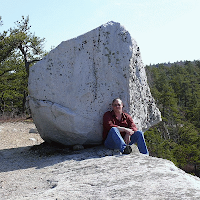Armchair travelers, like myself, ofen dream of doing things like this but I have to say as much as I'd love to see the desolate scenery of the Sahara, the reality is I'd hate the experience.
Benavav describes the open sores on his ass from riding a camel, traveling some 20 hours a day (the caravans hurry because if you don't, you'll die out there), the lack of food (one meal a day of rice and, if you're lucky, some dried goat or camel meat), using sand for toilet paper (imagine doing this after having "issues" due to rancid goat meat which the author experienced), drinking nasty water scooped from camel troughs, eating camel offal (guts) as an honored guest.
No thanks, if I ever get the chance to visit (not likely), I'll take the tour that uses a Range Rover and carry freeze-dried meals and toilet paper.
It is a great story though and a gripping read. It's interesting to learn about the men who work during the cooler parts of the year (when the temperature only gets to 120° F) to dig salt which was once as highly valued as gold. Caravans used to travel north from Timbuktu to the Mediterranean with gold and slaves and south with salt from the desert. No more gold on the caravans, slaves are now basically workers trapped in never-ending poverty, but salt is still highly valued and used as a form of currency in this part of Africa.
A salt mine and caravan of salt-laden camels are shown below.
Notice that the layer of white salt (the mineral name for rock salt is halite) has to be reached by digging down a couple of meters through the overlying rock. Imagine doing this on a substandard diet, weeks from civilization, in a remote outpost with no medical care, in 100° F plus temperatures. Not very fun.

Below is a picture of my wife and daughter on the Bonneville salt flats in western Utah near the Nevada border. Same thing happened here. Only difference is that in Mali the salt layer is under another couple of meter of sediments so has to be mined out.
While the conditions are hellish, the scenery in Mali can be beautiful. I thought it amusing, however, that the camel drivers laughed at the author when he declared the scenery beautiful - to them it was a terrible place of death.

It's like the early pioneers in the U.S. They believed that chopped down trees and farmed land was beautiful, the wilderness was not. It's hard to appreciate the scenery when you're struggling to survive!
I love reading travel books (not like I can go to many of these places). Anyone have any recommendations of good ones?






No comments:
Post a Comment